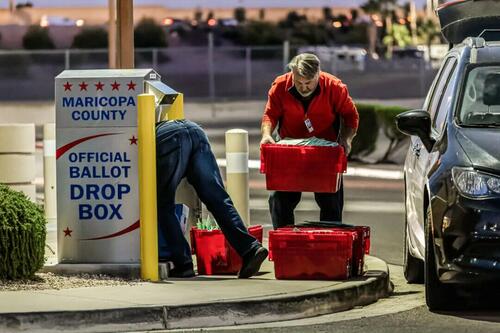
Authored by Chase Smith via The Epoch Times (emphasis ours),
In the ongoing legal battle over alleged election interference in Arizona in 2022, Maricopa County Superior Court Judge Geoffrey Fish issued a series of rulings this week denying motions to dismiss and motions to remand charges back to a state grand jury against Cochise County Supervisors Peggy Judd and Tom Crosby.

The rulings released on June 18 mean the case will proceed to trial.
Ms. Judd and Mr. Crosby are charged with conspiracy and interference with an election officer, both class 5 felonies.
The case stems from events following the 2022 general election in Arizona, when Ms. Judd and Mr. Crosby allegedly conspired to delay the canvassing of votes in Cochise County, prosecutors say.
According to the indictment, the defendants’ actions aimed to prevent the timely certification of the county’s election results, thereby obstructing the statewide canvass process.
Following the rulings, Arizona Attorney General Kris Mayes issued a statement reaffirming the seriousness of the charges and the state’s commitment to pursuing justice.
“This is a serious case, and the charges have merit,” Ms. Mayes stated in a press release. “Today’s ruling by the court supports that. While the defendants are innocent until proven guilty, as are all defendants in our criminal justice system, my office is prepared to move forward with this case and pursue justice for the people of Arizona.”
Ms. Judd and Mr. Crosby filed motions to remand their cases to a grand jury for a new determination of probable cause earlier this year.
They argued that the original grand jury proceedings were flawed, alleging that the state failed to properly instruct the grand jury on relevant legal standards, presented misleading testimony, and used privileged information improperly.
Judge Fish in his ruling stated that the grand jury was appropriately instructed and that the evidence presented did not constitute misleading testimony or misuse of privileged information.
The judge emphasized that the role of the grand jury is to determine whether probable cause exists to believe that a crime has been committed, not to conduct a mini-trial.
Motion to Dismiss Denied
The defendants also moved to dismiss the case, arguing that the state grand jury lacked jurisdiction under A.R.S. §21-422.
They claimed that the alleged crimes did not fall within the specific categories that a state grand jury is authorized to investigate and indict.
Judge Fish rejected this argument, stating that the actions of the defendants, if proven, constituted “intentional, knowing, or corrupt misconduct involving any person compensated by public funds,” which falls within the grand jury’s jurisdiction.
He further noted that the alleged interference took place in both Cochise and Maricopa counties, thus justifying the state grand jury’s involvement under the applicable statutes.
The defendants contended that their actions were protected by legislative immunity, asserting that their decisions regarding the canvassing process were legislative acts.
They argued that as elected officials, their votes and decisions on election matters were covered by legislative immunity, which shields legislators from prosecution for actions taken within their official legislative capacity.
However, Judge Fish dismissed this argument.
He explained that the act of canvassing election results is a mandatory, nondiscretionary function required by law, and failing to perform this duty does not qualify as a legislative act protected by immunity. Consequently, the court determined that legislative immunity did not apply to the defendants’ actions.
The court also addressed and dismissed several other defense arguments. These included claims that the statutes under which the defendants were charged were vague and that the conspiracy charge should only be prosecuted in Cochise County.
Judge Fish found that the statutes provided sufficient clarity to inform the defendants of the prohibited conduct and that the venue was appropriate due to the alleged impact on both Cochise and Maricopa counties.
Background on Allegations
The indictment alleges that between Oct. 11, 2022, and Dec. 1, 2022, Ms. Judd and Mr. Crosby conspired to delay the canvass of votes cast in Cochise County during the Nov. 8, 2022, general election.
In early October 2022, the defendants allegedly inquired about conducting a hand count of ballots for the upcoming election and were advised by the Cochise County Attorney’s Office that they lacked specific authority to conduct such a hand count.
Also in October, state Elections Director Kori Lorick informed the Cochise County Board of Supervisors (CCBS) that a full hand count would violate the Elections Procedure Manual.
Later that month, CCBS held a special hearing where they voted to conduct a hand count audit of all precincts, despite legal advice against it.
The day prior to the election, Judge Casey McGinley granted a preliminary injunction, enjoining the full hand count audit.
Two days after the election, Cochise County Attorney Brian McIntyre warned of potential criminal actions if an expanded hand count proceeded.
Ms. Judd and Mr. Crosby then filed a special action suit against Cochise County Elections Director Lisa Marra, alleging she refused to comply with the board’s commands.
In late November, CCBS allegedly delayed the certification of election results, prompting legal action from then-Arizona Secretary of State Katie Hobbs’ office.
On Dec. 1, Judge McGinley ordered the immediate canvassing of the election results, which Ms. Judd and Election Board Chair Ann English complied with, submitting the results to the secretary of state.
The indictment further alleges that from Nov. 14 to Nov. 28, 2022, they knowingly interfered with election officers’ duties, thereby preventing the timely transmission of the county’s election results to Ms. Hobbs’ office.
A pretrial conference is scheduled for Aug. 8, with the trial tentatively set to begin Aug. 15.
Authored by Chase Smith via The Epoch Times (emphasis ours),
In the ongoing legal battle over alleged election interference in Arizona in 2022, Maricopa County Superior Court Judge Geoffrey Fish issued a series of rulings this week denying motions to dismiss and motions to remand charges back to a state grand jury against Cochise County Supervisors Peggy Judd and Tom Crosby.

The rulings released on June 18 mean the case will proceed to trial.
Ms. Judd and Mr. Crosby are charged with conspiracy and interference with an election officer, both class 5 felonies.
The case stems from events following the 2022 general election in Arizona, when Ms. Judd and Mr. Crosby allegedly conspired to delay the canvassing of votes in Cochise County, prosecutors say.
According to the indictment, the defendants’ actions aimed to prevent the timely certification of the county’s election results, thereby obstructing the statewide canvass process.
Following the rulings, Arizona Attorney General Kris Mayes issued a statement reaffirming the seriousness of the charges and the state’s commitment to pursuing justice.
“This is a serious case, and the charges have merit,” Ms. Mayes stated in a press release. “Today’s ruling by the court supports that. While the defendants are innocent until proven guilty, as are all defendants in our criminal justice system, my office is prepared to move forward with this case and pursue justice for the people of Arizona.”
Ms. Judd and Mr. Crosby filed motions to remand their cases to a grand jury for a new determination of probable cause earlier this year.
They argued that the original grand jury proceedings were flawed, alleging that the state failed to properly instruct the grand jury on relevant legal standards, presented misleading testimony, and used privileged information improperly.
Judge Fish in his ruling stated that the grand jury was appropriately instructed and that the evidence presented did not constitute misleading testimony or misuse of privileged information.
The judge emphasized that the role of the grand jury is to determine whether probable cause exists to believe that a crime has been committed, not to conduct a mini-trial.
Motion to Dismiss Denied
The defendants also moved to dismiss the case, arguing that the state grand jury lacked jurisdiction under A.R.S. §21-422.
They claimed that the alleged crimes did not fall within the specific categories that a state grand jury is authorized to investigate and indict.
Judge Fish rejected this argument, stating that the actions of the defendants, if proven, constituted “intentional, knowing, or corrupt misconduct involving any person compensated by public funds,” which falls within the grand jury’s jurisdiction.
He further noted that the alleged interference took place in both Cochise and Maricopa counties, thus justifying the state grand jury’s involvement under the applicable statutes.
The defendants contended that their actions were protected by legislative immunity, asserting that their decisions regarding the canvassing process were legislative acts.
They argued that as elected officials, their votes and decisions on election matters were covered by legislative immunity, which shields legislators from prosecution for actions taken within their official legislative capacity.
However, Judge Fish dismissed this argument.
He explained that the act of canvassing election results is a mandatory, nondiscretionary function required by law, and failing to perform this duty does not qualify as a legislative act protected by immunity. Consequently, the court determined that legislative immunity did not apply to the defendants’ actions.
The court also addressed and dismissed several other defense arguments. These included claims that the statutes under which the defendants were charged were vague and that the conspiracy charge should only be prosecuted in Cochise County.
Judge Fish found that the statutes provided sufficient clarity to inform the defendants of the prohibited conduct and that the venue was appropriate due to the alleged impact on both Cochise and Maricopa counties.
Background on Allegations
The indictment alleges that between Oct. 11, 2022, and Dec. 1, 2022, Ms. Judd and Mr. Crosby conspired to delay the canvass of votes cast in Cochise County during the Nov. 8, 2022, general election.
In early October 2022, the defendants allegedly inquired about conducting a hand count of ballots for the upcoming election and were advised by the Cochise County Attorney’s Office that they lacked specific authority to conduct such a hand count.
Also in October, state Elections Director Kori Lorick informed the Cochise County Board of Supervisors (CCBS) that a full hand count would violate the Elections Procedure Manual.
Later that month, CCBS held a special hearing where they voted to conduct a hand count audit of all precincts, despite legal advice against it.
The day prior to the election, Judge Casey McGinley granted a preliminary injunction, enjoining the full hand count audit.
Two days after the election, Cochise County Attorney Brian McIntyre warned of potential criminal actions if an expanded hand count proceeded.
Ms. Judd and Mr. Crosby then filed a special action suit against Cochise County Elections Director Lisa Marra, alleging she refused to comply with the board’s commands.
In late November, CCBS allegedly delayed the certification of election results, prompting legal action from then-Arizona Secretary of State Katie Hobbs’ office.
On Dec. 1, Judge McGinley ordered the immediate canvassing of the election results, which Ms. Judd and Election Board Chair Ann English complied with, submitting the results to the secretary of state.
The indictment further alleges that from Nov. 14 to Nov. 28, 2022, they knowingly interfered with election officers’ duties, thereby preventing the timely transmission of the county’s election results to Ms. Hobbs’ office.
A pretrial conference is scheduled for Aug. 8, with the trial tentatively set to begin Aug. 15.
Loading…






